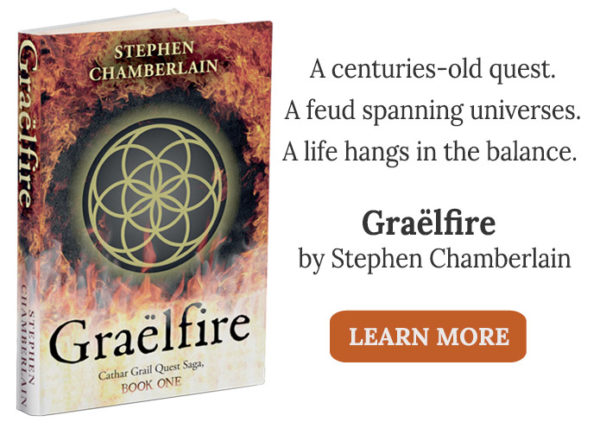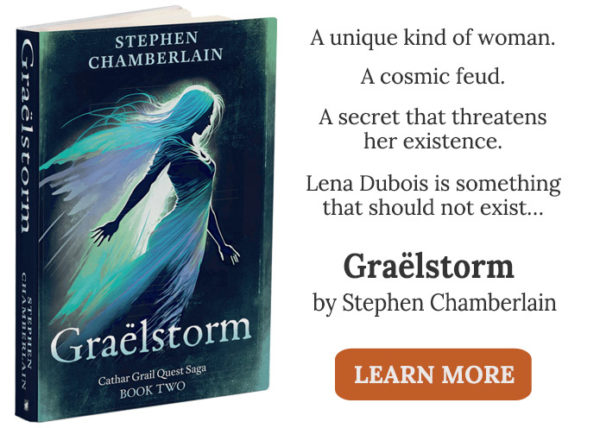“Achilles, without his heel, you wouldn’t even know his name today.” – Stan Lee.
Speculative fiction is full of heroes and villains who have superhuman powers. From sorcerers to warriors, their strength, speed, and skill dazzle us. But while these mighty figures might appear exciting, their appeal would dwindle without a flaw or weakness to limit their abilities. Here are some reasons for incorporating a vulnerability to otherwise invincible characters:
Nothing is Perfect
Perfection can be tedious. Invincibility is monotonous. Heroes and villains need at least one vulnerability for their opponent to exploit. If they are not susceptible to defeat, there are no stakes in the conflict, and the story becomes dull.
In my novels, Graëlfire and Graëlstorm, the three Arkheïa are emanations of a celestial being. Incarnate in a physical body, they exist betwixt and between the physical and celestial realms, belonging fully to neither. This dual nature creates strengths and weaknesses. They have supernatural powers, but they can’t stay in the physical realm for long as it corrupts their celestial essence, and they must retreat to liminal pocket dimensions called hölige sanctums to slow the process. The corruption of their celestial nature draws them into confrontation with each other, and they must rely on mortals to enforce their will during their hölige absences. The purpose of these features is to deny them omnipotence. Though they are incredibly powerful, the Arkheïa have challenges and limitations.
Tension and Drama
In any compelling story, conflict and tension are vital ingredients. If a character easily overcomes challenges, there are no risks, and their battles become predictable. Suspense springs from uncertainty in the outcome when characters confront adversity. A character’s Achilles’ heel creates obstacles that writers use to generate unexpected plot twists and tense encounters. The term originates from Greek mythology, where the hero Achilles was an almost invincible warrior except for a vulnerable spot on his heel. This led to his death when he was struck there by a poisoned arrow during the Trojan War.
Speculative fiction is a genre that requires mastery of this art of vulnerability. In George R. R. Martin’s fantasy epic, Game of Thrones, the White Walkers are nigh-immortal villains intent on destroying humanity. They can raise an army of zombie-like wights, but they have an Achilles’ heel – dragonglass and Valyrian steel can kill them. Another example is Superman. He is the iconic superhero with amazing powers, but he is vulnerable to Kryptonite—a radioactive mineral that can harm him. Without this susceptibility, it would be hard for an antagonist to level the playing field in any confrontation with him. Consider also Bram Stoker’s vampire, Dracula. He has supernatural strength, he can shapeshift and hypnotize people, but he is less powerful during daylight, and he can be repelled by garlic and religious symbols. He is ultimately destroyed by decapitation and a knife through the heart. Then there is the dark wizard Voldemort from the Harry Potter series. His fear of death led him to split his soul into Horcruxes in a bid to become immortal. Harry’s goal is to locate and destroy these Horcruxes, setting the stage for the Voldemort’s ultimate destruction.
What all the above characters have in common is fallibilities. They keep us on the edge of our seats as we watch them become exposed, making thrilling and suspenseful dramas.
Relatability
Flawless heroes might be awe-inspiring, but they risk alienating audiences by being unrelatable. Characters who experience struggles and emotions like ordinary people are more realistic. One such example is Spider-Man. Imbued with superhuman strength and agility thanks to a bite from a radioactive spider, Peter Parker is nerdy, picked-on, and he worries about money—all personal challenges a teenage audience can relate to. And then there is Frodo Baggins from The Lord of the Rings. His susceptibility to the One Ring’s corruptive influence drains his resolve as he nears his goal. Seeing him battle inner demons is something we can all connect with.
Vulnerabilities create storylines with ups and downs as characters grapple with their limitations. This makes us cheer their triumphs and empathize with their setbacks.
Bottom Line
Suspension of disbelief is an audience’s willingness to ignore the impossible to enjoy a story. To achieve this, the storyteller must create convincing characters and riveting plots. An Achilles’ heel is a storytelling device that allows us to become emotionally invested in a narrative. By giving characters personal struggles or a fatal flaw, writers create internal and external conflicts that keep the drama suspenseful and engaging. An all-powerful character with no vulnerabilities would be a one-dimensional figure, making them less relatable and their victories less satisfying. It’s our imperfections than make us human, and the interplay between strengths and weaknesses makes larger-than-life characters more real and enduring in popularity.



